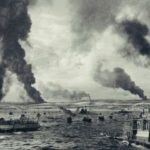 I looked forward to seeing the movie “Dunkirk.” I even went to see it at a movie theater; unusual for me. It seemed to start off weird, though, and never quite recovered. It was almost as if they were trying to minimize the heroic stuff. It also felt a bit like they were trying to drag out one little vignette into a feature-length film. It started out to be, apparently, the adventures of one soldier looking for ways to run out on his buddies and get on a ship to safety before anyone else. As much as I wanted to like the movie, I just didn’t, and the more I thought about it, the less I liked it. It could have been so much more.
I looked forward to seeing the movie “Dunkirk.” I even went to see it at a movie theater; unusual for me. It seemed to start off weird, though, and never quite recovered. It was almost as if they were trying to minimize the heroic stuff. It also felt a bit like they were trying to drag out one little vignette into a feature-length film. It started out to be, apparently, the adventures of one soldier looking for ways to run out on his buddies and get on a ship to safety before anyone else. As much as I wanted to like the movie, I just didn’t, and the more I thought about it, the less I liked it. It could have been so much more.
Then I had lunch with a friend and he told me something about the real story of Dunkirk that I didn’t know, and that was, inexplicably, not in the movie.
 But let me first back up and give you context. The basic story line is that in 1940 when France fell, the Nazis had about 350,000 British soldiers trapped on the beach at Dunkirk. The situation was dire because they were completely surrounded by Nazi soldiers on 3 sides and the English Channel on the other. There was no military naval rescue possible. The commander wanted to relay a message to Naval authorities in Britain to let them know the situation was dire, but didn’t want to give away too much information that the Nazis could intercept, nor deliver a message to his countrymen that seemed hopeless. The commander cabled three words: “But if not.”
But let me first back up and give you context. The basic story line is that in 1940 when France fell, the Nazis had about 350,000 British soldiers trapped on the beach at Dunkirk. The situation was dire because they were completely surrounded by Nazi soldiers on 3 sides and the English Channel on the other. There was no military naval rescue possible. The commander wanted to relay a message to Naval authorities in Britain to let them know the situation was dire, but didn’t want to give away too much information that the Nazis could intercept, nor deliver a message to his countrymen that seemed hopeless. The commander cabled three words: “But if not.”
You may know the rest of the story. The British Navy responded by putting out a call to owners of small private crafts. Many of the boats were commandeered, but that effort was overtaken by largely uncoordinated volunteers, coming forward in their boats and manning the boats themselves – many hundreds of little boats. They crossed the channel to rescue as many of the British soldiers as they could. For some reason – probably because Hitler over-managed and often did so badly, the Nazis hesitated outside Dunkirk. The result was that instead of having one day to save a few thousand men, the boats were able to make repeat trips until 338,000 British soldiers were delivered safely to Britain while the Royal Air Force held back the Luftwaffe. This was the Dunkirk miracle.
 My friend told me these words, “But if not,” but it didn’t register at first. I was trying to place them in some sort of recent historical context, racking my brain for something perhaps Churchill said previously. He gave me a minute to try to get the reference, before explaining that it was from the story of the fiery furnace, in the book of Daniel. Then I remembered, because once upon a time my Bible knowledge, such as it was, was based on the King James version. The relevant passage of Daniel chapter 3 is:
My friend told me these words, “But if not,” but it didn’t register at first. I was trying to place them in some sort of recent historical context, racking my brain for something perhaps Churchill said previously. He gave me a minute to try to get the reference, before explaining that it was from the story of the fiery furnace, in the book of Daniel. Then I remembered, because once upon a time my Bible knowledge, such as it was, was based on the King James version. The relevant passage of Daniel chapter 3 is:
15 Now if ye be ready that at what time ye hear the sound of the cornet, flute, harp, sackbut, psaltery, and dulcimer, and all kinds of musick, ye fall down and worship the image which I have made; well: but if ye worship not, ye shall be cast the same hour into the midst of a burning fiery furnace; and who is that God that shall deliver you out of my hands?
16 Shadrach, Meshach, and Abednego, answered and said to the king, O Nebuchadnezzar, we are not careful to answer thee in this matter.
17 If it be so, our God whom we serve is able to deliver us from the burning fiery furnace, and he will deliver us out of thine hand, O king.
18 But if not, be it known unto thee, O king, that we will not serve thy gods, nor worship the golden image which thou hast set up.
 This may seem like archaic language, and it is, but when I started reading the Bible, the King James Version was all we had. That was in the 1960’s. At the time, most people had some Bible literacy, and I suppose that if we were to travel another 20 years back in time, we’d find that people had even more understanding, and it was all from the King James version.
This may seem like archaic language, and it is, but when I started reading the Bible, the King James Version was all we had. That was in the 1960’s. At the time, most people had some Bible literacy, and I suppose that if we were to travel another 20 years back in time, we’d find that people had even more understanding, and it was all from the King James version.
The “Dunkirk miracle” to me is that enough people immediately grasped the import of those three little words that it instantly galvanized the nation to action. They understood that the British commander was telling them that the situation was just like that of the faithful companions of Daniel: entirely hopeless short of a miracle.
